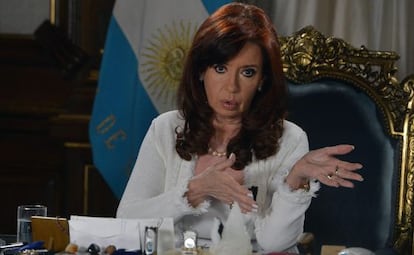Argentina makes exchange offer to creditors to sidestep US court injunction
President Fernández de Kirchner says unpaid bondholders can swap bonds for domestic paper


Creditors who own Argentina’s restructured 2005 and 2010 exchange bonds whose interest payments have been blocked by United States District Court Judge Thomas Griesa will be able to swap them for domestic bonds, President Cristina Fernández de Kirchner has announced. The exchange bonds were negotiated under American and European laws during Argentina’s sovereign debt restructuring proceedings, but the new local bonds will be governed by Argentinean law and thus bypass the US court injunction. The country’s refusal to comply with the order led to it entering default status on July 30.
Economy Minister Axel Kicillof had anticipated this maneuver two months ago. President Fernández de Kirchner announced the news on national television on Tuesday night and Judge Griesa has threatened to hold Argentina in contempt for violating the court’s ruling. The injunction requires the South American country to pay the “vulture funds” – creditors who refused to take distressed exchange bonds – before it pays its conciliatory bondholders. The court’s contempt may carry certain fines but Argentinean cabinet chief Jorge Capitanich said the judge has yet to explain the possible consequence of such a declaration. Guillermo Nielsen, former finance minister under President Néstor Kirchner (2003-2007) during Argentina’s debt restructuring process, said a declaration of contempt would exclude Argentina, its provinces and its businesses from the international financial sector for years.
US District Judge Thomas Griesa has threatened to hold Argentina in contempt, a decision that may carry certain fines
Still, the South American government said it must meet its obligations to 92.4 percent of its creditors – the ones who accepted the distressed exchange bonds in 2005 and in 2010. The administration plans to submit a bill to Congress on Wednesday to offer unpaid bondholders a voluntary exchange. “It’s an option, not an obligation,” the president said. Some American funds are subject to internal rules that do not allow them to buy shares without legal oversight in their own country. But in light of Argentina’s default, some of them may choose to sell their bonds to other companies that are not subject to the same restrictions.
Congress will debate the bill and the government expects the backing of an absolute majority in both houses, though some deputies have wavered in their loyalty in the last few days. On Sunday, Fernández lost the support of Río Negro Governor Alberto Weretilneck. He announced his endorsement of a rival Peronist, Sergio Massa, for the 2015 elections. Consequently, Fernández chose to emphasize the need for unity among the country’s politicians, saying that the nation’s “sovereignty” was in peril.
The president’s initiative calls on the Economy Ministry to find new mechanisms so that creditors may receive their past due interest payments. Fernández authorized the ministry to remove the Bank of New York Mellon, the country’s middleman in the disbursement process. Instead, payments will be made at the central bank or through another entity recommended by bondholders.
The bill also offers debt swap deals to the 7.6 percent of investors who had rejected them in 2005 and in 2010, including the so-called “vulture funds.” Fernández said her detractors accused her and the Economy Ministry of “inexperience” in negotiating with speculative investors. But, she added, local and international banks that tried to strike a deal with the litigant funds in the last few weeks have also failed.
The president reminded viewers that the Obama administration had called Griesa’s ruling “excessive”
The president was emotional during her speech, on the verge of tears as she remembered her late husband and talked about the 2005 restructuring process. “I am a little nervous. Forgive me. I really feel like we are experiencing a very big injustice.” She talked about the backing she has received across Latin America and from more than 100 American academics, saying that those shows of support were not for Argentina itself but because of “this crazy desire to destroy the most successful debt restructuring process, which promoted inclusive [social] growth” after the political and socio-economic collapse of 2001.
She reminded viewers that the Obama administration had called Griesa’s ruling “excessive.” Hours before, Foreign Affairs Minister Héctor Timerman said the United States did not formally respond to Argentina’s complaint before The Hague. A US State Department representative said the administration would not accept that jurisdiction.
Translation: Dyane Jean François
Tu suscripción se está usando en otro dispositivo
¿Quieres añadir otro usuario a tu suscripción?
Si continúas leyendo en este dispositivo, no se podrá leer en el otro.
FlechaTu suscripción se está usando en otro dispositivo y solo puedes acceder a EL PAÍS desde un dispositivo a la vez.
Si quieres compartir tu cuenta, cambia tu suscripción a la modalidad Premium, así podrás añadir otro usuario. Cada uno accederá con su propia cuenta de email, lo que os permitirá personalizar vuestra experiencia en EL PAÍS.
¿Tienes una suscripción de empresa? Accede aquí para contratar más cuentas.
En el caso de no saber quién está usando tu cuenta, te recomendamos cambiar tu contraseña aquí.
Si decides continuar compartiendo tu cuenta, este mensaje se mostrará en tu dispositivo y en el de la otra persona que está usando tu cuenta de forma indefinida, afectando a tu experiencia de lectura. Puedes consultar aquí los términos y condiciones de la suscripción digital.








































